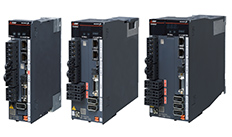
Energy Efficiency in Industrial Automation: The Power Factor Improving DC Reactor in MR-J4-A Servo Amplifiers
In today’s industrial world, energy efficiency isn’t just a buzzword it’s a business advantage. Mitsubishi Electric’s MR-J4-A Series Servo Amplifiers offer more than just motion control performance they come equipped with a Power Factor Improving DC Reactor that helps reduce energy consumption, lower operational costs, and increase system reliability.
In this guide, we break down how the DC reactor in the MR-J4-A series improves energy efficiency and why it should be part of your industrial automation strategy.
Why Energy Efficiency Matters
Cost Savings
Reduced power consumption leads directly to lower electricity bills. Over time, these savings add up especially in 24/7 operations.
Lower Environmental Impact
Efficient systems draw less power from the grid, reducing carbon emissions. It's a step toward sustainable automation.
Improved Equipment Lifespan
Efficient power handling means cooler, more stable operation, which extends the life of motors, drives, and supporting infrastructure.
Understanding Power Factor—and Why It Matters
Power factor measures how effectively electrical power is used. A perfect score (PF = 1.0) means all power is going toward productive work. Lower scores indicate wasted energy.
Poor Power Factor =
-
Higher utility costs
-
Electrical system stress
-
Increased heat and inefficiency
Improving the power factor reduces energy waste and supports long-term reliability in your automation system.
What Is a Power Factor Improving DC Reactor?
A DC reactor is an inductive component installed in the DC link of a servo amplifier. In the MR-J4-A series, it plays a vital role in smoothing voltage, limiting harmonics, and reducing inrush current—all of which contribute to a better power factor.
Key Benefits:
-
Improved Power Factor: Reduces reactive power losses.
-
Lower Heat Generation: Reduces the load on upstream transformers and components.
-
Increased System Longevity: Protects internal components from power fluctuations.
How to Implement the DC Reactor in MR-J4-A Servo Systems
Installation Tips
-
Install in the DC link circuit of the MR-J4-A amplifier.
-
Use shielded, high-quality cables for stable operation.
-
Follow Mitsubishi’s guidelines for proper mounting, cooling clearance, and protection.
Configuration with MR Configurator2
-
Use MR Configurator2 software to set voltage/current limits and validate power efficiency.
-
Adjust regenerative energy settings if paired with a braking resistor or energy recovery module.
-
Run diagnostic simulations before production to verify reactor behavior under real load.
Maintenance & Monitoring
-
Inspect regularly for physical wear, loose connections, or overheating.
-
Use software tools to track power factor improvements and spot anomalies in power consumption.
Real-World Use Cases
Manufacturing Facilities
In motor-intensive environments, DC reactors can help reduce total energy demand and extend equipment life.
HVAC & Refrigeration Systems
Continuous-duty applications benefit from lower power draw, reducing wear on compressors and fans.
Data Centers
High reliability is essential. DC reactors help stabilize voltage and ensure steady performance under variable loads.
Find the Right MR-J4-A Model
Explore our selection of Mitsubishi MR-J4-A Servo Amplifiers at Industrial Automation Co.:
| Model | Output Power |
|---|---|
| MR-J4-10A | 100W |
| MR-J4-20A | 200W |
| MR-J4-40A | 400W |
| MR-J4-70A | 750W |
| MR-J4-100A | 1kW |
| MR-J4-200A / 200A-RJ | 2kW |
| MR-J4-350A / 350A-RJ | 3.5kW |
Conclusion
Mitsubishi’s MR-J4-A Servo Amplifiers, when paired with a Power Factor Improving DC Reactor, do more than control motion they control energy costs, protect your equipment, and support sustainability. Whether you’re upgrading your automation line or planning a new build, integrating a DC reactor is a smart move for long-term performance and savings.
Smarter motion. Lower costs. Greener operations. That’s the power of the MR-J4-A with power factor correction.
For more information, contact PLG Automation:
Email: sales@plgautomation.com
Phone: 800-906-9271
